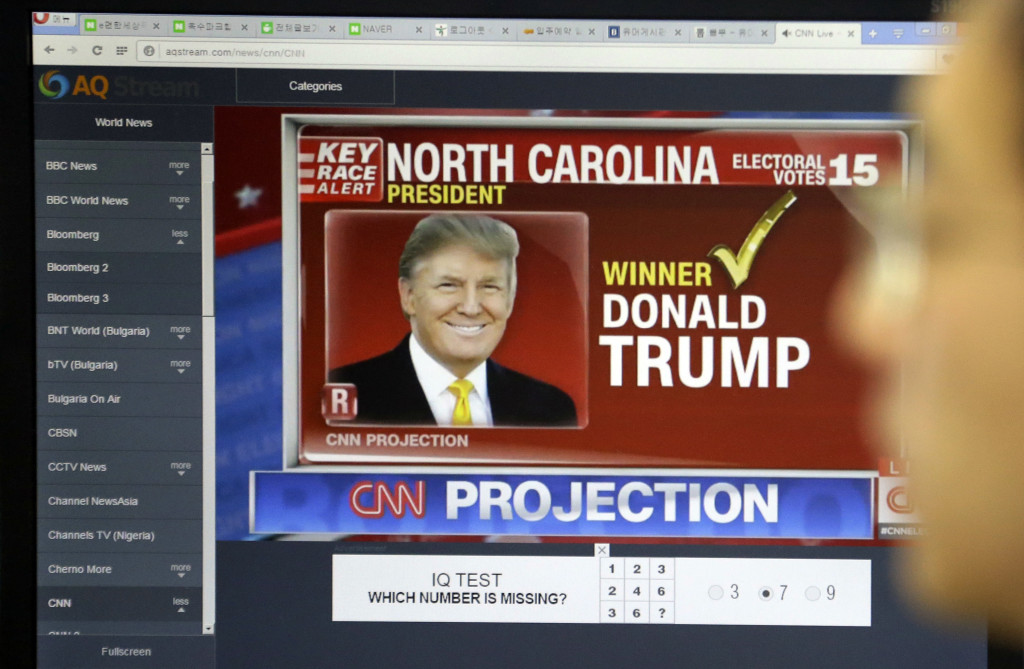
A currency trader works next to a monitor showing Republican presidential candidate Donald Trump at the foreign exchange dealing room of the KEB Hana Bank headquarters in Seoul, South Korea on Nov. 9. The rising prospect of a Trump presidency jolted markets around the world Wednesday, sending Dow futures and Asian stock prices sharply lower as investors panicked over uncertainties on trade, immigration and geopolitical tensions. AP
The prospect of a Donald Trump presidency unnerves businesspeople and economists who see him as a reckless novice who might disrupt trade and imperil the struggling global economy.
Financial markets tumbled Wednesday as Trump claimed victory after a campaign marked by fiery anti-foreign rhetoric and promises to tear up trade deals, restrict immigration and lock up political rivals.
Trump’s confrontational stance toward China and other trading partners, shifting and radical positions on key issues and lack of detailed plans have left many saying it is impossible to know what he might do in office.
That has added to jitters over his upset victory. By 3 a.m. EST (0800 GMT) Trump had claimed 276 electoral votes to Hillary Clinton’s 218. Trump vowed to unite the nation after a long campaign season fraught with antagonism.
“We simply can’t know what type of President Trump will be,” said Paul Ashworth, chief U.S. economist for Capital Economics, in a report.
“Will he be the demagogue from the campaign trail, who threatened to lock up his political opponents, punish the media, build border walls and start a global trade war?” said Ashford. “Or is he capable of becoming a statesmanlike figure who leads in a more measured manner?”
Trump’s campaign tapped into American economic anxiety and frustration among workers who feel they have been left behind by globalization.
The celebrity businessman threatened to scrap trade deals and penalize U.S. firms that shift jobs abroad. Proposals including building a wall along the Mexican border to block immigration resonated with white working class voters who feel abandoned by traditional leaders.
The world will see a rise in protectionism if Trump makes good on promises of a more aggressive approach to dealing with countries such as China, Germany, Japan and South Korea, said Ha Keon-hyeong, an economist at Shinhan Investment Corp. in Seoul.
“It will strengthen protectionism,” said Ha. “That’s basically bad.”
Disruption to trade could hit economies such as China and South Korea especially hard as they struggle with sluggish growth. China’s exports in the first 10 months of this year were down 7.7 percent from the same period of 2015.
Trump offered so few details during the campaign that he left the impression the White House would run on instinct. That has left many around the world uneasy about the direction of the world’s largest economy and market.
“Trump appears to have only a passing grasp of policy, so it is important that he appoints people with experience,” said Ashford. “This is where Trump’s running mate, Indiana Gov. Mike Pence, could prove to be pivotal.”
Others saw a potential bright side to Trump’s proposed immigration curbs.
South Korean tech firms could find it easier to compete with Silicon Valley for talent if a Trump administration makes it harder for foreign experts to get visas, said Marcello Ahn, a fund manager for Quad Investment Management in Seoul.
“In the long term, it could be an opportunity for the South Korean tech industry,” said Ahn. “Those engineers could come to us.”